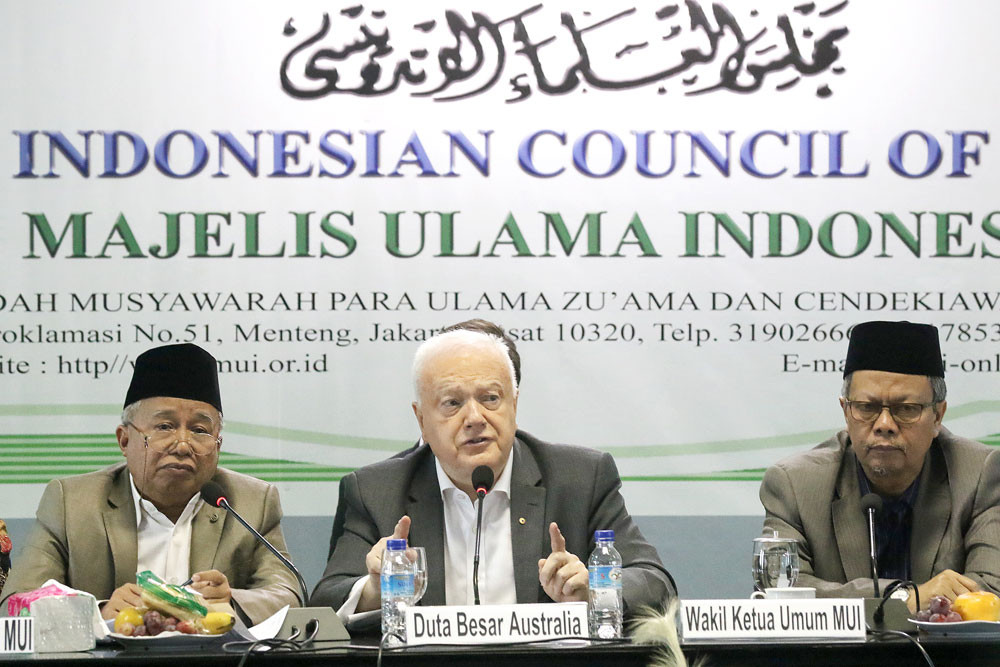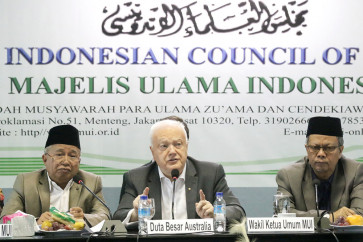Popular Reads
Top Results
Can't find what you're looking for?
View all search resultsPopular Reads
Top Results
Can't find what you're looking for?
View all search resultsHistoric challenge for Abrahamic religions
The recent attack by a white supremacist in Christchurch, New Zealand, revealed to us what the most extreme form of Islamophobia can be. The terrorist had reportedly developed a burning hatred of the growing number of Muslims that he saw as “invading his land”.
Change text size
Gift Premium Articles
to Anyone
 Condolence: Indonesian Ulema Council (MUI) international relations chairman Muhyiddin Junaidi (left), Australian Ambassador to Indonesia Gary Quinlan (center) and MUI deputy chairman Yunahar Ilyas (right) hold a press conference to address recent shootings in Christchurch, New Zealand. (The Jakarta Post/Dhoni Setiawan)
Condolence: Indonesian Ulema Council (MUI) international relations chairman Muhyiddin Junaidi (left), Australian Ambassador to Indonesia Gary Quinlan (center) and MUI deputy chairman Yunahar Ilyas (right) hold a press conference to address recent shootings in Christchurch, New Zealand. (The Jakarta Post/Dhoni Setiawan)
T
he recent attack by a white supremacist in Christchurch, New Zealand, revealed to us what the most extreme form of Islamophobia can be. The terrorist had reportedly developed a burning hatred of the growing number of Muslims that he saw as “invading his land”. Analysts have pointed out that if this could happen (of all places) in New Zealand, it could happen anywhere.
The rare attack was also a manifestation of the historic “Abrahamic” problem. Relations among the Abrahamic religions of Islam, Christianity and Judaism remain fraught with negativity, tension and hostility. At times they do result in oppression, discrimination and persecution.
This should not surprise us. In the past 2,000 years, there has never been a century where Muslims, Christians and Jews lived in total peace worldwide. In each century, at least two or all three of the religions’ followers were in conflict somewhere. In the 20th century, the unresolved Arab-Israeli conflict — with Palestine at the heart of it — has strained ties between Muslims and Jews, many of whom are unaware that the conflict between Palestine and Israel should not mean a conflict between Islam and Judaism.
True, the world has much improved. The United Nations Charter — as do other such charters — promotes religious freedom and tolerance. Multiculturalism is a global political norm, connectivity is rising and interfaith conferences are flourishing. All good things indeed.
Yet, none of the above changes the fact that at the grassroots, there is still much negativity among the Abrahamic religions. Keep your ear to the ground and you will hear various degrees of negativity: from sheer ignorance, to discomfort, suspicion, resentment, hatred and violent opposition. Yet, while we are sensitive to racial bigotry, we still tend to have a blind spot for religious bigotry.
Consider the following surveys:
* A survey by the Syarif Hidayatullah Islamic State University found that of 63 percent of Muslim teachers harbored intolerant views of other religions;

















